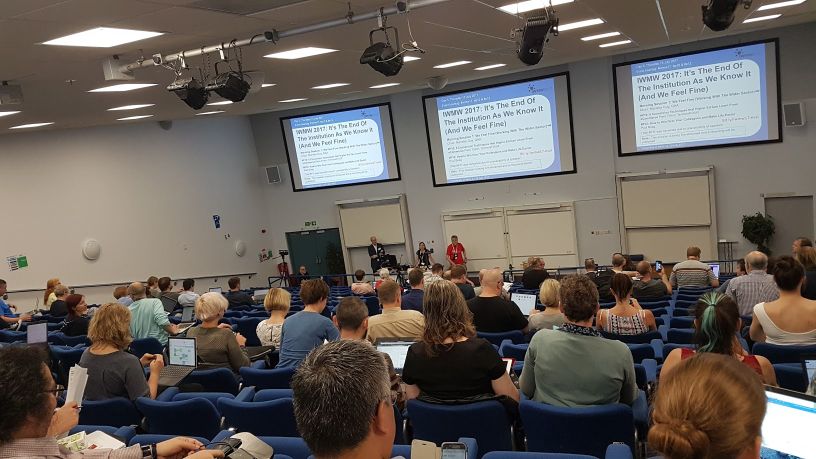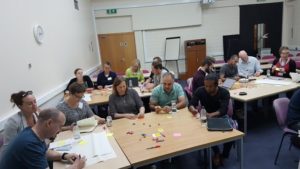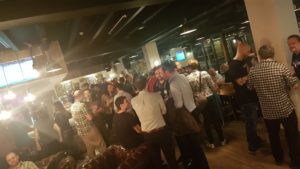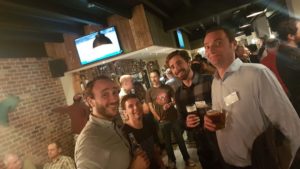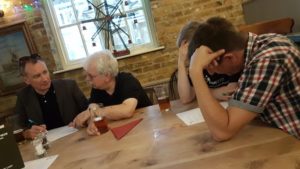How To Tell Your Plenary From Your Panel Session
For anyone who hasn’t been to a conference before, or isn’t overly familiar with the lingo, the different sessions and activities at IWMW events can be a bit baffling! What on earth is a plenary and what’s the difference between a Masterclass and a Workshop?
Well, for the IWMW delegates amongst you (a delegate is just someone who attends the event!) here are some of the different types of activity that we may run across the three days of the event.
Sessions
You will see on the programme from IWMW 2017 that the event is split up into ‘sessions’. These are usually a morning or afternoon where activities are grouped together under a sub-theme of the main theme. The Opening Session gives a chance for Brian Kelly, the founder of the IWMW series, and the Advisory Group to welcome everyone to the conference, set the tone for the event, and give some general information about the event, the venue, and what is going to happen over the three days.
There are then subsequent Sessions over the three days, each one of which will have a Chair for that session, and that Chair might even be me! Chairs are usually members of the Advisory Board, or other delegates, and they will look after and introduce the speakers for that session, make sure that their slides are loaded and working, read out any notices for delegates, and generally keep everything to time. Sometime referred to as ‘housekeeping’ there will also be regular updates across the sessions, e.g. about room changes, social events, or where people need to be and when.
These are also good people to approach if you have any questions throughout the event.
Keynote speaker
Most conferences usually have a Keynote Speaker. They will be someone that is (usually) well-known, influential, motivating, inspiring and will speak to the central theme of the event. They will capture the essence of the conference theme (Streamlining Digital) and be able to highlight it to the whole audience in a short period of time, leaving you inspired and geared up for the rest of the amazing speakers and facilitators that will follow. They may, or may not, be controversial, but either way they are there to be thought-provoking and lay the foundations for the rest of the conference sessions.
Plenary session
This is, quite simply, a session that all delegates will attend at the same time. These usually take place in the main conference room (a lecture theatre for IWMW) and each day will start in the main room with a plenary speaker (or two or three). This gives everyone an opportunity to hear about a topic that will be relevant to everyone, and for everyone to ask questions of the speaker and all delegates to hear the response.
Plenary talks tend to be between half an hour and 45 minutes in length, and may be delivered by one, or more speakers.
Workshop
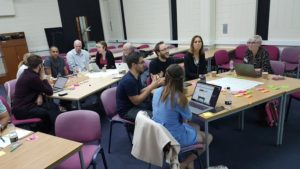
Workshops and masterclasses give a great opportunity for delegates to share their knowledge and experience.
A Workshop is designed to teach a smaller number of delegates a specific skill in an interactive way. At IWMW there will be a number of Workshops all running at the same time and so delegates choose their preference when they book their place at the events.
Workshops are usually limited to between 20 and 30 places for each one so that each delegate can really get the most out of the session and learn from, and with, the other delegates, as well as the expert Workshop facilitator.
Workshop rooms are usually smaller teaching rooms arranged so that delegates can sit in smaller groups and interact with each other as the session progresses.
Groups may be asked to undertake specific tasks and then feed back to the room, so that all learning can be captured and shared.
For IWMW 2018 we will be asking Workshop (and Masterclass) facilitators to submit specific learning outcomes for their session to enable delegates to choose the Workshop, or Masterclass, most suitable for them, and report back to their institutions on these learning outcomes.
Workshops usually last around 90 minutes.
Masterclass
A Masterclass is a longer Workshop and gives the expert facilitator an opportunity to really explore the topic with the delegates that have chosen their session in greater detail.
The Masterclasses will go into more detail than the Workshops, but the format, layout, learning objectives and group work will generally be the same.
Masterclasses are longer, up to two hours 45 minutes, with a couple of breaks in between for comfort and reflection.
Both Workshops and Masterclasses may be run by one, or more, experts.
Panel session
Panel sessions usually involve up to five panelists commenting on a specific topic or challenge, in a discussion moderated by a session Chair. The topic or challenge may be predetermined before IWMW begins or evolve as discussions start to take place and new topics and challenges emerge.
They usually take place in the main hall so that all delegates can hear the panel debate and submit questions, either over Twitter or live via a roaming microphone.
They are often lively, sometimes controversial, but always incredibly interesting and informative, as experts from different institutions or the private sector, share their experiences around the topic in question.
Panel sessions usually last up to 45 minutes.
Lightning talk
A lightning talk is a very short presentation lasting only a few minutes, with several lightning talks taking place over one designated session, usually as part of a plenary session (which all delegates attend).
These will be new for IWMW 2018 and have arisen from feedback that often delegates have something to share but it isn’t quite long enough or developed enough for a plenary session or workshop.
Lightning talks give delegates the opportunity to, perhaps, test the water for a longer session at a future event, or get some feedback on a live project, given the room full of peers and experts that they have.
Depending on the number of lightning talks submitted they could be anything from five minutes to 15, with accompanying slides where appropriate.
Debates
Debates are lively sessions exploring the arguments for and against a certain topic. We have had them at previous IWMW events (see CMS Debate: Challenging the Consensus from IWMW 2006 and “Web accessibility is difficult to implement” and “The Web should be driven by needs not visions” debates from IWMW 2003) and it would be great to see the return of the debate for 2018.
Debates usually have a couple of experts for as well as a couple of experts against, and they are kept in order by a Debate Chair, similar to the Panel Chair previously. There is also the opportunity for audience members to express their views.
Debates usually last between half and hour and 90 minutes and take place in the main lecture theatre.
Networking
Now, mention the work ‘networking’ and people tend to recoil in the horror of it all. So, don’t think of it as ‘networking’ – think of it as chatting to amazing, like-minded (or not!) people that you are bound to have a great, and mutually beneficial, time with.
There’s plenty of time to do this at IWMW starting with the pre-conference get together the night before the main conference starts, to refreshments breaks, the sessions themselves (who knows who you might be sat next to) and then the Organised Fun that is the social events.
I’ve made some amazing connections through the ‘in-betweeny’ bits and chatting to people about who they are, where they’re from, what they do, and what their current challenges are.
Don’t be afraid! Last year we had People Bingo to get people chatting throughout the event – but its really as simple as heading over to someone to say, ‘Hello, I’m whoever. What brought you to IWMW this year?’ and take it from there! You won’t be disappointed.
On-campus accommodation
One of the beauties of IWMW 2018 is that all delegates will be staying in accommodation that is on the University campus. This adds to the community-feel of the event, enables delegates to meet for breakfast and squeeze in some early-morning networking, and its not far to head home after the evening social events. It also keeps the cost down, which is key in these times of budget-cuts across the HE sector.
Once you book your conference place your accommodation will also be secured, and if you have a distance to travel you are welcome to pay for an extra night’s accommodation and come up the night before, join in the pre-conference get-together, and meet some old and new friends.
Social event (AKA Organised Fun!)
It wouldn’t be a proper IWMW event without the social programme! We like to make the most of the campus that we have as well as give people the opportunity to see the host City, and this year will be no exception.
Following the success of last year, we will be having a pre-conference meet up (and quiz!) the night before the conference starts at a venue in York, then the main conference dinner on the first night. This isn’t a black tie do, by any manner or means! Come as you are and enjoy a lovely meal with colleagues old and new, and then there is free time afterwards to head into town or explore the bars on campus.
We will be having a BBQ on campus on the second night (and possibly some entertainment and/or a quiz!), early doors, again, so that people can head into York and explore the sights, sounds, and smells of the City. We’ll have scoped out some lovely places to go and small groups will be heading to different places depending on their preferences. Whether you like a good coffee, a real ale, a fancy-pants cocktail or some footie and pool, there will be someone heading to where you would like to go!
Conclusion
So, there you have it! A whistle-stop tour of the make-up of IWMW. And if there is something that I have missed, or another type of session you would like to suggest, do get in touch!
Useful resources
Also check out the blog posts on the TerminalFour blog about why getting out and about is a great idea for Digital professionals:
- Why getting out and about is a great idea for Digital Professionals #1
- Why getting out and about is a great idea for Digital Professionals #2
- Why getting out and about is a great idea for Digital Professionals #3
Biographical Details
 Claire Gibbons is a freelance consultant, working mainly across the HE and charity sectors on content marketing, web and digital improvement projects, and digital governance audits and strategies.
Claire Gibbons is a freelance consultant, working mainly across the HE and charity sectors on content marketing, web and digital improvement projects, and digital governance audits and strategies.
Prior to going freelance in the summer of 2016, Claire headed up the Web and Print teams at the University of Bradford, and was responsible for the University’s website and printed materials, leading two small teams of web and print specialists for many years, and through many a change.
Claire’s general mantra in life is ‘user first’ especially across all aspects of the student journey, and is always on the look-out for new collaborations and initiatives to enable teams, and individuals to work better together to improve the user journey.
For further information see Claire’s:

